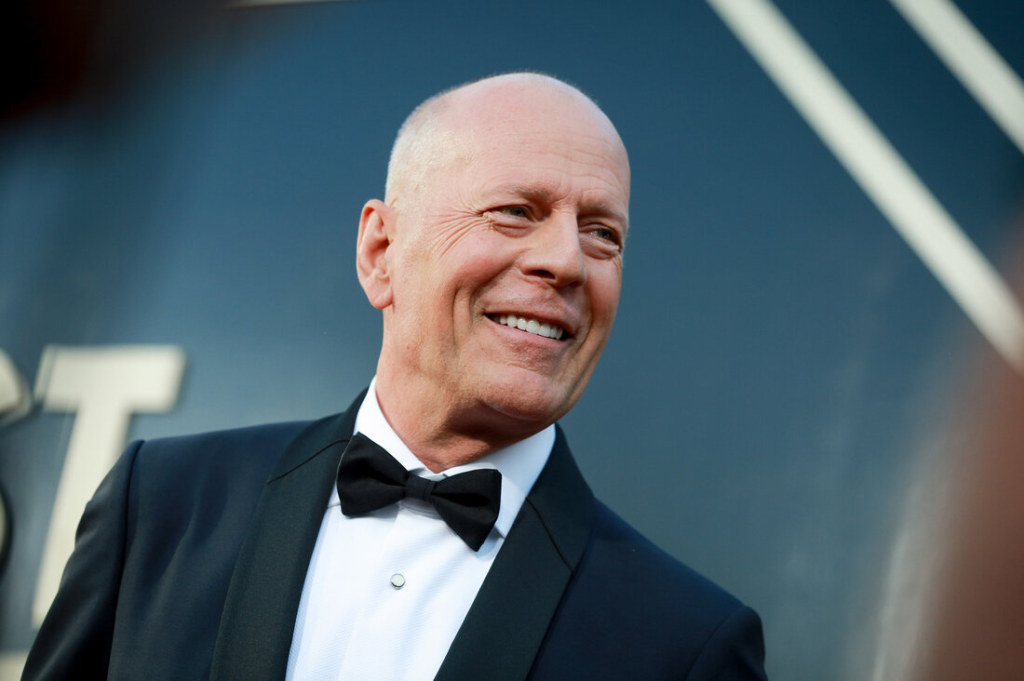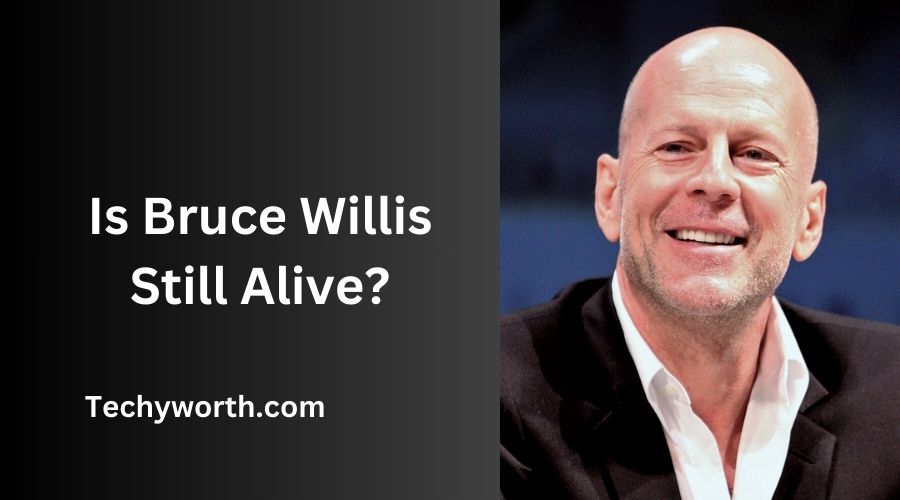Bruce Willis is an iconic actor known worldwide for his legendary performances in films like Die Hard, Pulp Fiction, and The Sixth Sense. His on-screen charisma and unforgettable roles have made him a household name for decades. In recent years, however, many fans have been concerned about his health and wellbeing. To address the question, yes, Bruce Willis is still alive, but he is facing significant health challenges that have impacted his life and career.
Bruce Willis: A Hollywood Legend
Before delving into his current health status, it’s essential to acknowledge the enormous contributions Bruce Willis has made to the entertainment industry. Born on March 19, 1955, in Idar-Oberstein, West Germany, Willis began his acting career in television before transitioning to film. He achieved fame with his role as John McClane in the Die Hard franchise, cementing his status as an action star. Over his career, he starred in over 100 films, earning accolades and adoration from fans across the globe.
Why Are Fans Asking, “Is Bruce Willis Still Alive?”
Speculation about Bruce Willis’s health and status began circulating widely after his retirement from acting in March 2022. His family announced that Willis was stepping away from his career due to a diagnosis of aphasia, a condition affecting language and communication abilities. This news sparked concern and rumors about his health, prompting questions about his current wellbeing.
In February 2023, his diagnosis was further clarified as “frontotemporal dementia (FTD),” a progressive neurological disorder. This revelation shed light on the challenges he has been facing and the reasons behind his decision to retire.

Understanding Bruce Willis’s Health Condition
1. What is Frontotemporal Dementia?
Frontotemporal dementia (FTD) is a group of brain disorders that primarily affect the frontal and temporal lobes of the brain. These areas are responsible for personality, behavior, and language. Symptoms of FTD can vary but often include:
- Changes in personality and behavior.
- Difficulty with speech and language.
- Impaired executive functions, such as decision-making and problem-solving.
Unlike Alzheimer’s disease, which typically affects memory, FTD is more likely to impact individuals in their middle years, often between the ages of 40 and 65.
2. How Did the Diagnosis Affect Bruce Willis?
The initial “diagnosis of aphasia” hinted at communication difficulties, which were already apparent during Willis’s later acting projects. Colleagues reportedly noticed signs of memory lapses and struggles with delivering dialogue. Further medical evaluations revealed that FTD was the underlying cause of his symptoms.
Bruce Willis’s Current Life and Family Support
Bruce Willis has always prioritized his family, and in this challenging chapter of his life, they have become his strongest pillar of support. His wife, Emma Heming Willis, his ex-wife, Demi Moore, and his five daughters have rallied around him, providing constant care and love.
In December 2024, Demi Moore described Willis’s condition as “stable.” She emphasized the importance of meeting him where he is, cherishing the present moments, and creating joyful experiences as a family. The blended family dynamic has been a source of strength for Bruce as he navigates his health journey.
Family Milestones and Public Appearances
Despite his diagnosis, Bruce continues to share meaningful moments with his family:
- Thanksgiving 2024: His daughters, Tallulah and Scout, shared heartwarming photos of their father enjoying the holiday with them, demonstrating his enduring spirit.
- Special Occasions: The family ensures that Bruce remains part of significant celebrations, creating cherished memories while raising awareness about his condition.
Raising Awareness About Frontotemporal Dementia
The Willis family has taken an active role in spreading awareness about FTD. Through public updates and advocacy, they aim to educate people about the disorder and reduce the stigma surrounding dementia-related conditions.
Importance of Awareness
- Understanding the Challenges: FTD affects communication, behavior, and cognitive abilities, making it essential for families and caregivers to adapt their interactions.
- Need for Research: The family’s advocacy highlights the importance of funding research to better understand and treat FTD.
- Supporting Affected Families: By sharing their journey, the Willis family inspires others facing similar challenges to seek help and embrace hope.

Bruce Willis’s Legacy: A Career to Remember
While his health issues have forced him to step away from the spotlight, Bruce Willis’s contributions to film and television remain unforgettable. His roles have left a lasting impact on Hollywood, and his work continues to entertain audiences worldwide.
Some of His Most Iconic Films:
| Film Title | Year | Role |
|---|---|---|
| Die Hard | 1988 | John McClane |
| Pulp Fiction | 1994 | Butch Coolidge |
| The Sixth Sense | 1999 | Dr. Malcolm Crowe |
| Armageddon | 1998 | Harry Stamper |
| Looper | 2012 | Joe |
These films showcase the versatility of his acting, ranging from intense action to emotional drama.
Why Fans Continue to Ask “Is Bruce Willis Still Alive?”
In today’s digital age, misinformation spreads quickly, especially concerning celebrity health and status. Speculation about Bruce Willis often arises from:
- Social Media Rumors: Unverified posts can create confusion about a celebrity’s condition.
- His Retirement: Since Willis stepped away from public life, fans have fewer updates, leading to assumptions.
- Health Challenges: Public awareness of his diagnosis prompts people to search for the latest news about his wellbeing.
Also Read: Wordle Hint Today Newsweek:Guide to Mastering the Daily Puzzle
The Impact of Bruce Willis on Pop Culture
Bruce Willis’s contributions to film and television have left an indelible mark on pop culture. His portrayal of John McClane in the Die Hard series revolutionized the action hero archetype, introducing a relatable and vulnerable character in a genre dominated by invincible figures. Beyond action films, his performances in The Sixth Sense and Pulp Fiction demonstrated his versatility as an actor, showcasing his ability to handle complex roles in drama and dark comedy.
His catchphrases, particularly “Yippee-Ki-Yay,” have become cultural icons, referenced in various media. Bruce Willis’s influence extends beyond his roles, inspiring a generation of actors to bring authenticity and emotional depth to their characters.

How Frontotemporal Dementia Differs from Other Neurological Disorders
Frontotemporal dementia (FTD) stands apart from other neurological disorders like Alzheimer’s or Parkinson’s disease due to its distinct characteristics. Understanding these differences helps shed light on the challenges faced by Bruce Willis and others with the condition.
| Feature | Frontotemporal Dementia | Alzheimer’s Disease | Parkinson’s Disease |
|---|---|---|---|
| Age of Onset | 40–65 | 65 and older | 60 and older |
| Primary Symptoms | Behavior, language changes | Memory loss | Motor symptoms (tremors) |
| Affected Brain Areas | Frontal and temporal lobes | Hippocampus and cerebral cortex | Basal ganglia |
| Progression | Rapid | Gradual | Gradual |
| Treatment Options | Symptom management | Symptom management | Symptom management |
This table illustrates the unique challenges of FTD, particularly its impact on communication and behavior, which directly affect daily interactions and quality of life.
The Role of Family in Supporting Bruce Willis
The support of loved ones is crucial for anyone battling a chronic illness, and Bruce Willis’s family has shown exceptional dedication. His wife, Emma Heming Willis, and ex-wife, Demi Moore, work closely to ensure that Bruce receives the best care possible. Together with his five daughters, they have created a strong support network.
Their efforts include:
- Coordinated Care: They collaborate with healthcare professionals to manage his condition effectively.
- Emotional Support: The family focuses on creating positive experiences and cherishing moments with Bruce.
- Advocacy and Awareness: By speaking publicly about FTD, they aim to help other families facing similar challenges.
The Willis family’s proactive approach has set an example of unity and compassion, inspiring others to prioritize care and connection.
Also Read: Drew Brees Makes His Nbc Debut, internet Amazed By His New Hair
Lessons from Bruce Willis’s Journey
Bruce Willis’s journey offers profound lessons about resilience, family, and the importance of health advocacy:
- Cherishing Loved Ones: His story underscores the value of family support during life’s most challenging times.
- Raising Awareness: By sharing his diagnosis, the Willis family has highlighted the need for more research and understanding of neurological conditions.
- Leaving a Legacy: Despite stepping away from acting, Bruce Willis’s work continues to inspire and entertain millions, demonstrating the enduring impact of art and storytelling.
Bruce Willis’s journey reminds us that even in adversity, it is possible to find strength, connection, and purpose.

Final Thoughts: Is Bruce Willis Still Alive?
Yes, Bruce Willis is still alive and living with the love and care of his family as he battles frontotemporal dementia. While his health challenges have changed the course of his life, his legacy as one of Hollywood’s greatest actors remains intact.
Fans around the world continue to admire Bruce Willis for his resilience, and his family’s advocacy work is helping to shine a light on an often-misunderstood condition. As we reflect on his incredible career and current journey, it’s clear that Bruce Willis’s impact goes far beyond the silver screen.
Also Read: Wordle Hint Today: Your Guide to Solving the Daily Puzzle
Frequently Asked Questions (FAQs)
1. Is Bruce Willis still alive?
Yes, Bruce Willis is still alive. He is living with his family and battling frontotemporal dementia, a progressive neurological disorder.
2. What illness does Bruce Willis have?
Bruce Willis has been diagnosed with frontotemporal dementia (FTD), which affects his behavior, communication, and cognitive functions.
3. Why did Bruce Willis retire from acting?
He retired in March 2022 due to a diagnosis of aphasia, a condition that impairs language abilities. This was later clarified as frontotemporal dementia.
4. How is Bruce Willis doing now?
According to his family, Bruce Willis’s condition is stable. He is surrounded by loved ones who support him as he navigates his health challenges.
5. Who takes care of Bruce Willis?
Bruce’s care is supported by his wife, Emma Heming Willis, his ex-wife Demi Moore, and his five daughters, creating a strong family network.
6. What is frontotemporal dementia?
FTD is a neurological condition affecting the frontal and temporal lobes of the brain, leading to changes in behavior, personality, and language.
7. When was Bruce Willis diagnosed with dementia?
Bruce Willis’s frontotemporal dementia diagnosis was publicly shared by his family in February 2023.
8. What is Bruce Willis’s legacy in Hollywood?
Bruce Willis is celebrated for his roles in iconic films like Die Hard and The Sixth Sense. His impact on action and drama genres is unmatched.
9. How has Bruce Willis’s family supported him?
His family provides emotional and medical support, raises awareness about FTD, and shares updates to educate the public about the condition.
10. What are Bruce Willis’s most famous movies?
His most iconic films include Die Hard, Pulp Fiction, The Sixth Sense, Armageddon, and Looper. These roles define his versatile career.
